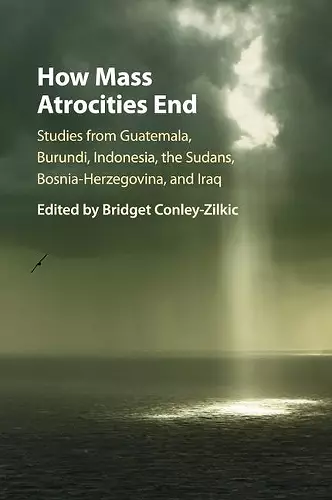How Mass Atrocities End
Studies from Guatemala, Burundi, Indonesia, the Sudans, Bosnia-Herzegovina, and Iraq
Format:Paperback
Publisher:Cambridge University Press
Published:11th May '17
Currently unavailable, and unfortunately no date known when it will be back
This paperback is available in another edition too:
- Hardback£100.00(9781107124370)

How do mass atrocities end? Six case studies reveal the decisions and factors that help decrease mass violence against civilians.
How do mass atrocities end? This book reveals the processes, decisions, and factors that influence the decline of mass violence in case studies from Burundi, Guatemala, Indonesia, Sudan, Bosnia, and Iraq.Given the brutality of mass atrocities, it is no wonder that one question dominates research and policy: what can we, who are not at risk, do to prevent such violence and hasten endings? But this question skips a more fundamental question for understanding the trajectory of violence: how do mass atrocities actually end? This volume presents an analysis of the processes, decisions, and factors that help bring about the end of mass atrocities. It includes qualitatively rich case studies from Burundi, Guatemala, Indonesia, Sudan, Bosnia, and Iraq, drawing patterns from wide-ranging data. As such, it offers a much needed correction to the popular 'salvation narrative' framing mass atrocity in terms of good and evil. The nuanced, multidisciplinary approach followed here represents not only an essential tool for scholars, but an important step forward in improving civilian protection.
'How Mass Atrocities End … proves itself a critically important book, one that goes beyond trite good/evil dualisms in order to present a realistic assessment of the political, economic, and military factors (among others) that contribute to a secession of large-scale violence. This is not a book for idealists, but it is a book for those who would stand a chance as seeing their ideals for peace actually implemented.' Guy Lancaster, International Journal on World Peace
ISBN: 9781107561649
Dimensions: 230mm x 152mm x 14mm
Weight: 370g
242 pages